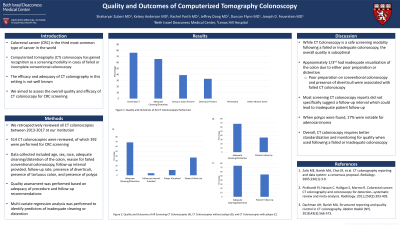Tuesday Poster Session
Category: Colorectal Cancer Prevention
P3210 - Quality and Outcomes of Computerized Tomography Colonography
Tuesday, October 24, 2023
10:30 AM - 4:00 PM PT
Location: Exhibit Hall

Has Audio

Shaharyar Zuberi, MD
Beth Israel Deaconess Medical Center
Boston, MA
Presenting Author(s)
Shaharyar Zuberi, MD, Kelsey Anderson, MD, Rachel Porth, MD, Jeffrey Dong, MD, Duncan J. Flynn, MD, Joseph D. Feuerstein, MD
Beth Israel Deaconess Medical Center, Boston, MA
Introduction: Colorectal cancer (CRC) is the third most common type of cancer. While conventional colonoscopy is the gold standard for polyp detection, computerized tomography colonography (CTC), has gained recognition as a screening modality in cases of failed/incomplete colonoscopy. However, the efficacy and adequacy of CTC in this setting is not well known. We conducted a study to assess the overall quality and efficacy of CTC for CRC screening.
Methods: We performed a retrospective chart review of all CTCs performed between 2013-2017 at our institution. We analyzed 514 CTCs of which 392 were performed for CRC screening. Data collected included age, sex, race, adequate cleaning/distention of colon, reason for failed conventional colonoscopy, follow-up rate, and presence of diverticuli, tortuosity, and polyps. Quality assessment was performed based on adequacy of the procedure and follow up recommendations. Multi-variate regression analysis, using R, was performed to identify predictors of inadequate cleaning and distention.
Results: Out of 514 patients, median age was 67, 33% were male, and 68% were white. Out of all 514 CTCs, 34.2% had inadequate bowel cleaning or distention of the colon. Regression analysis revealed that poor prep on conventional colonoscopy and presence of diverticuli were associated with a failed CTC due to inadequate bowel cleaning or distension (p < 0.05). No patients had reported complications.
Out of the 392 CTCs performed for CRC screening, 31.4% had inadequate cleaning or distention of the bowel. 95.7% of CTC reports did not specifically suggest a follow up interval. 61.5% of patients had no follow-up at any point. 83.7% of patients with inadequate screening did not have a repeat colonoscopy or CTC within one year. Polyps were found in 11% of screening CTCs. For patients with a normal CTC, 35% had follow-up, 75.4% of which was appropriately within 5 years. For patients with polyps on CTC, 53.5% had follow-up, 82.6% of which was within 1 year. Out of the 23 patients who had polyps on CTC and follow up, 17% were found to have adenocarcinoma.
Discussion: While CTC is a safe screening modality following a failed/inadequate colonoscopy, the overall quality was suboptimal. Approximately one third had inadequate visualization of the colon and most did not recommend follow-up CRC screening. However, when polyps were found, 17% were notable for adenocarcinoma. CTC requires better standardization and monitoring for quality when used following a failed/inadequate colonoscopy.
Disclosures:
Shaharyar Zuberi, MD, Kelsey Anderson, MD, Rachel Porth, MD, Jeffrey Dong, MD, Duncan J. Flynn, MD, Joseph D. Feuerstein, MD. P3210 - Quality and Outcomes of Computerized Tomography Colonography, ACG 2023 Annual Scientific Meeting Abstracts. Vancouver, BC, Canada: American College of Gastroenterology.
Beth Israel Deaconess Medical Center, Boston, MA
Introduction: Colorectal cancer (CRC) is the third most common type of cancer. While conventional colonoscopy is the gold standard for polyp detection, computerized tomography colonography (CTC), has gained recognition as a screening modality in cases of failed/incomplete colonoscopy. However, the efficacy and adequacy of CTC in this setting is not well known. We conducted a study to assess the overall quality and efficacy of CTC for CRC screening.
Methods: We performed a retrospective chart review of all CTCs performed between 2013-2017 at our institution. We analyzed 514 CTCs of which 392 were performed for CRC screening. Data collected included age, sex, race, adequate cleaning/distention of colon, reason for failed conventional colonoscopy, follow-up rate, and presence of diverticuli, tortuosity, and polyps. Quality assessment was performed based on adequacy of the procedure and follow up recommendations. Multi-variate regression analysis, using R, was performed to identify predictors of inadequate cleaning and distention.
Results: Out of 514 patients, median age was 67, 33% were male, and 68% were white. Out of all 514 CTCs, 34.2% had inadequate bowel cleaning or distention of the colon. Regression analysis revealed that poor prep on conventional colonoscopy and presence of diverticuli were associated with a failed CTC due to inadequate bowel cleaning or distension (p < 0.05). No patients had reported complications.
Out of the 392 CTCs performed for CRC screening, 31.4% had inadequate cleaning or distention of the bowel. 95.7% of CTC reports did not specifically suggest a follow up interval. 61.5% of patients had no follow-up at any point. 83.7% of patients with inadequate screening did not have a repeat colonoscopy or CTC within one year. Polyps were found in 11% of screening CTCs. For patients with a normal CTC, 35% had follow-up, 75.4% of which was appropriately within 5 years. For patients with polyps on CTC, 53.5% had follow-up, 82.6% of which was within 1 year. Out of the 23 patients who had polyps on CTC and follow up, 17% were found to have adenocarcinoma.
Discussion: While CTC is a safe screening modality following a failed/inadequate colonoscopy, the overall quality was suboptimal. Approximately one third had inadequate visualization of the colon and most did not recommend follow-up CRC screening. However, when polyps were found, 17% were notable for adenocarcinoma. CTC requires better standardization and monitoring for quality when used following a failed/inadequate colonoscopy.
Disclosures:
Shaharyar Zuberi indicated no relevant financial relationships.
Kelsey Anderson indicated no relevant financial relationships.
Rachel Porth indicated no relevant financial relationships.
Jeffrey Dong indicated no relevant financial relationships.
Duncan Flynn indicated no relevant financial relationships.
Joseph Feuerstein indicated no relevant financial relationships.
Shaharyar Zuberi, MD, Kelsey Anderson, MD, Rachel Porth, MD, Jeffrey Dong, MD, Duncan J. Flynn, MD, Joseph D. Feuerstein, MD. P3210 - Quality and Outcomes of Computerized Tomography Colonography, ACG 2023 Annual Scientific Meeting Abstracts. Vancouver, BC, Canada: American College of Gastroenterology.
